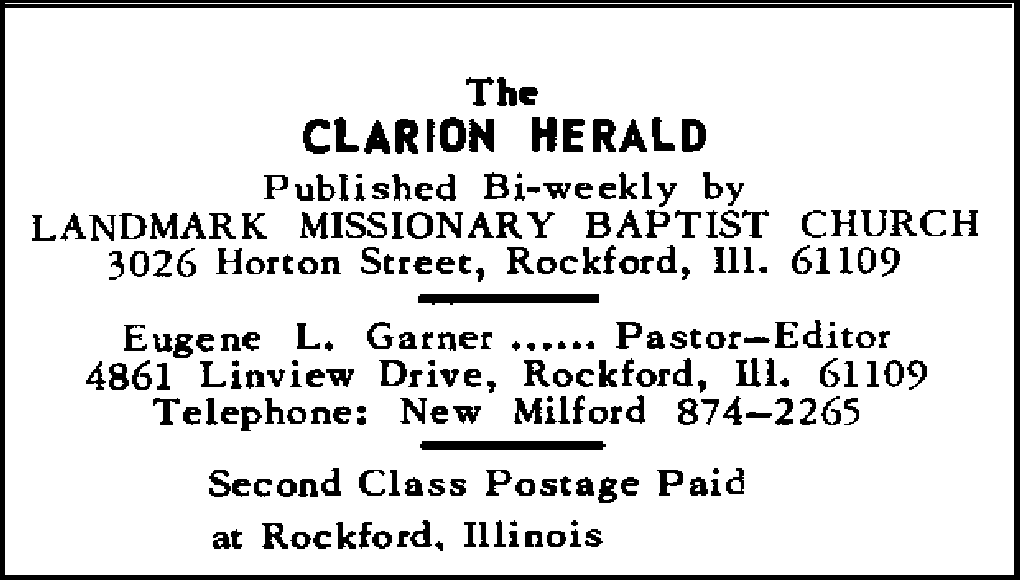
|
 |
 |
 |
|
 
|
|
|
HANDLING GOD'S WORD HONESTLY
For the man of God to sacrifice intellectual integrity on the altar of religious expediency is to purchase recognition and approval at far too exorbitant and shameful a price. To handle the word of God deceitfully (even to avoid the censure of dear brethren) is to render one's self untrustworthy as an expositor of the sacred scriptures. Beside this, there is a time of reckoning ahead. Each of us must give account of our stewardship. And the very first-principle of responsible stewardship is FAITHFULNESS! (I Cor. 4:2).
Passionate arguments, which ignore the immediate context of any biblical passage, is an unworthy instrument for any true servant of God. No biblical doctrine needs the undergirding of human wisdom. And such spurious webs as are often woven, by a manipulation of God's word to support one's personal philosophy, can only lead to disaster!
Interpretation must come from a study and comparison of the scriptures. Never is it safe for one to search the word to prove
a philosophical, or theological,
Continued on Page 2
|
|
|
|
THE MIND OF CHRIST - FIDELITY
IN REBUKE
"The Lord turned and looked upon Peter", (Luke 22:61).
Divinely sympathetic toward the frailties and infirmities of a tired, suffering and tempted people, Jesus never spoke one harsh or severe word unnecessarily. He was forbearing to the ignorant, encouraging to the weak, tender to the penitent and loving to all; yet, how utterly faithful He was as the Reprover of sin! Though silent under the wrongs that He suffered personally, with what burning invectives did he lay bare the masked corruption and hypocrisy of the Pharisees! When the Father's name and temple were profaned His avenging hand swept the mammon-crowd away - re-establishing the superscription, "Holiness to the Lord", over the defiled altar!
And the attitude of Jesus was just the same toward His own beloved disciples. With what unwavering fidelity did He administer rebuke when they needed it. At times a withering reprimand was conveyed by an impressive word (Matt. 16:23); sometimes by a silent look, (Lk. 22:16). Faithful always were the wounds of this Friend.
|
|
|
|
|
Page - 2
Are you faithful to your Lord in rebuking evil? Not with "the wrath of man, which worketh not the righteousness of God", but with a holy jealousy for His glory, feeling, with the sensitive honor of "a good soldier of Jesus Christ" that an affront offered to Him is offered to yourself? To give a wise reproof requires Christian prudence and delicate discretion. An erring brother is not often reclaimed by an inconsiderate exposure of his failings. Yet, fidelity must never be compromised for the sake of a false peace. Even a friendship, established by winking at sin, is purchased at too exorbitant a price!
The apostle Peter made reference to "our beloved brother Paul" who had once honestly reproved him. There was nothing for which he loved this brother more dearly than for his honest boldness of Christian reproof. Had Paul, in this crisis, timidly evaded the ungracious
|
|
|
|
task of rebuking his fellow-apostle, what havoc might have resulted!
How many times has a timely reprimand, or a word of loving caution, spared one a life-time of sin and sorrow? Yet, how terribly often, has the neglect of an occasion, crying out for some word of loving counsel or rebuke, been neglected - to the utter and eternal ruin of one who might have been rescued from destruction.
Let none of us be such spiritual cowards as to remain silent when the name of our dear Lord is profaned. At the very least we may place our disapproval on the sin by such a solemn, holy demeanor as to refuse to smile at the unholy allusion, or ribald jest.
How good, how precious, how powerful is even a loving word of rebuke - spoken gently, faithfully and courteously, from the depth of Christian character, and in the strength of the Lord!
HANDLING GOD"S WORD ... Continued
viewpoint to which he is already committed!
We must learn to, contentedly, "Let God be TRUE"! and to let the word say what it says, rather than what we think it ought to have said (or wish it had said) - remembering that those who teach others involve themselves, not only in deeper responsibility before God, but also in a far weightier judgment! (James 3:1).
The word of God is "forever settled in heaven; by it ALL shall be judged in the last day.
|
|
|
|
|
Studies in I Corinthians
SEXUAL EXPERIENCE
IN GOD'S ORDER
(First Corinthians 7:1-9)
Though some people tend to get offended at any discussion related to sexual experience, no exposition of this First Corinthian letter is complete without it. The safeguard of Christian morals was important at Corinth in the first century. Nor is it any less vital in Your City, U.S.A. in the twentieth century!
Paul deals with this subject in response to a specific question directed to him by someone who was a member of the Corinthian church. We do not know the exact question. Perhaps someone wondered whether it might not be wise for Christians to just get away from the opposite sex and live like monks. Such a thing actually became a popular practice during the Middle ages, when many came to regard any sexual activity as dirty, degrading and unworthy of a Christian. But, this only led to disaster; one cannot run away from the drives that God has placed within the human body for good cause. Yet, there is surely nothing wrong if an individual devotes himself to a life of (pure) celibacy to more fully dedicate his life to a specific worthwhile goal. Thus, Paul wrote:
Now concerning the things whereof ye wrote unto me: It is good for a man not to touch a woman. Nevertheless, to avoid fornication, let every man have his own wife, and let every woman have her own husband. (vs. 1-2)
|
|
|
|
The context shows that Paul is, basically, discussing a proper exercise of the body's sexual power within the marriage relationship. Rather than opposing marriage, Paul sets forth the glory of a proper marriage union as illustrative of the relationship that exists between Christ and His church, (Eph. 5:21-33). Though no two people should ever marry simply to legalize the satisfaction of their sexual desires, the Scriptures clearly teach that any sexual expression between two people outside the bond of marriage is abominable in the sight of God! Nor is sex within marriage to be for the sole purpose of pro-creation. Paul urges that marriage partners enjoy the sharing of sexual experience often. In fact, a reverent and regular sharing of sexual experience, within the bonds of security which marriage provides, is a basic and essential ingredient in the proper, healthy maintenance of the marriage relationship.
Let the husband render unto the wife due benevolence: and likewise also the wife unto her husband. The wife hath not power of her own body, but the husband: and likewise also the husband hath not power of his own body, but the wife. Defraud ye not one the other, except it be with consent for a time, that ye may give yourselves to fasting and prayer; and come together again, that Satan tempt you not for your incontinency. (vs. 3-5).
Not only does sexual exercise (within marriage) fulfill the need of one's marriage partner, it is designed to teach us something about ourselves. Paul is not grant-
|
|
|
|
|
ing license for a man to "demand his rights" in this area. In fact, for one to demand sex of his wife (just because he feels like it) is to destroy the beauty and ecstasy of the experience - and marital happiness with it. Unless the experience can be one of mutual fulfillment and satisfaction - when each partner freely gives himself, or herself, to the other - it is selfish and self-centered, and not pleasing to God.
On the other hand, for either marriage partner to, unilaterally, refuse participation in sexual union is to violate the command of God's word and to damage the relationship severely. Only by mutual agreement, and to some spiritual end, may sexual union be temporarily suspended; but then a man and his wife are to "come together again", lest one or the other be tempted by Satan through the inability to restrain sexual desire.
But, marriage is not for everyone.
But I speak this by permission, and not of commandment. For I would that all men were even as I myself. But every man hath his proper gift of God, one after this manner, and another after that. (vs. 6-7).
Thus, Paul views both marriage and singleness as a special "gift" from God. He inclines some toward marriage - where they may come to a deeper appreciation of His love through the intimacy of a human relationship designed by His perfect wisdom. Others are inclined toward singleness (and enabled to walk therein in purity), that their lives may be fully devoted to some
|
|
|
|
worthwhile task for His glory and praise.
I say therefore to the unmarried and widows, It is good for them if they abide even as I. But if they cannot contain, let them marry: for it is better to marry than to burn. (vs. 8-9).
Paul is here discussing the same subject as it relates to the unmarried and widows. Because of the distressing times (vs. 26), he wishes that they might be able to remain single, as himself (though it is almost certain that he had once had a wife). In a later letter to Timothy, however, he urges young widows to remarry, (I Tim. 5:14). If any Christian cannot remain single without a burning passion for sexual activity, Paul insists that it is better for that one to marry!
No one has the ability to fill his own sexual needs any more than he does to meet his own spiritual needs. Any attempt to do so is purely mechanical, pacifies for but a fleeting moment and leaves one, not only psychologically unfulfilled, but also with a sense of frustration and self-contempt. To seek fulfillment of one's sexual need outside the marriage relationship - though it may give a temporary, pleasing sensation - will leave one without the deep satisfaction of a shared spiritual experience, with a sense of sin- guiltiness before God, and with both a subconscious disrespect and lack of trust toward the one who has shared the experience.
To fully know the divinely-purposed ecstasy of marriage union is impossible to those who reject
|
|
|
|
|
God's order, whereby two people (recognizing His lordship, and desiring to please Him) become "one flesh" according to the order of His word. In like manner, no one can know the full blessedness of communion with God apart from identifying themselves with Christ in a New Testament church wherein he is regarded as being a member "of His body, of His flesh, and of His bones", (Eph. 5:30).
A mutual love for God is a very basic ingredient for a happy and lasting marriage relationship; both partners will then be concerned to follow His pattern for the maintenance of their marriage union. This is, in fact, the very first-principle of sexual happiness in marriage. Self-discipline, which places the need of one's mate above his own, is a second important principle. These, with a generous supply of mutual respect, will not only make the sexual union of marriage partners more meaningful; they will go a long way toward putting divorce lawyers out of business! Above all, it will promote the kind of Christian harmony in the home as will truly honor the Lord who made us.
THE BLESSEDNESS OF TRUE HUMILITY
"Learn of me, for I am meek and lowly in heart; and ye shall find rest unto your souls", (Matt. 11:29). "Be clothed with humility; for God resisteth the proud, and giveth grace to the humble. Humble yourselves therefore under the mighty hand of God, that He may exalt you in due time", (I Pet. 5:5-6).
(Continued on Page 6)
|
|
|
|
CALLING SIN BY ITS PROPER NAME
The footnote in the New International Version at II Kings 18:4 is most interesting. When Hezekiah found the brazen serpent made by Moses in the wilderness still being worshipped, He destroyed it. The NIV says, ". . .he called it Nehush- tan". The footnotes explain the meaning - "a serpent made of brass".
One is made to wonder how such an idol could have existed so long. It would seem that in the reformation movements of one of the judges or kings, it would have been destroyed. My opinion is that it was not recognized as an idol and hence was preserved. Perhaps they justified it by NOT calling it an idol. Hezekiah, however, came and called it what it really was - a brass image of a snake.
How often we justify sin by calling it a different name! Some call adultery, "a meaningful relationship". We excuse covetousness by calling it "prudence" or "economy". A life of sensual pleasure is "living with gusto".
In answer to a critic, Abraham Lincoln asked, "How many legs does a cow have" "Four" was the reply. "If you call her tail a leg, how many does she have?" asked Lincoln. "Five", was the answer. "NO", said Lincoln, "Just calling a tail a leg, doesn't make it a leg".
Have we made a similar mistake? Do we think that sin is not sin, just because we do not call it by its right name?
-- Ancil Jenkins
in PULPIT HELPS
|
|
|
|
|
SOMETHING IS WRONG
When members refuse to attend church, something is wrong. If a person is too sick to attend, something is wrong with his health. If he thinks he does not need to go, something is wrong with his mind. If he doesn't have enough interest to attend, something is wrong with his attitude. If he is too busy to attend, something is wrong with his schedule. If he lets company keep him away, he isn't keeping company with the right people. You can know what is wrong if you will take an honest look at yourself.
Let's get our WANT TO fixed, and honor the Lord by being in services NEXT SUNDAY!
-- The HAWAII MESSENGER
|
|
|
|
THE BLESSEDNESS ........ Continued
Such as are haughty and conceited often rebel against the ways of God to their own destruction. Those who humble themselves under His mighty hand will be protected by it. Whatever knowledge we may acquire in the schools of human learning, the Scriptures do not regard us as truly wise until we are: poor in spirit, lowly in heart and crucified to the world, (Prov. 11:2; I Cor. 1 & 2).
The more fully one recognizes his own bankruptcy in the sight of God, the greater will be his capacity for divine grace, and the more abundantly will it be supplied to him. How precious in the sight of the Lord is the soul that - broken from its own vain conceit, has enlisted under the banner of Jesus as a meek soldier of the cross!
It is most becoming that a mere creature bend itself low in the presence of its Creator! Let us, therefore, laying aside our worldly vanity, put on the garment of meekness and walk humbly with our God!
Lord, if Thou Thy grace impart,
Poor in spirit, meek in heart,
I shall as my Master be,
Rooted in humility.
Simple, teachable, and mild,
Changed into a little child:
Pleased with all the Lord provided,
Weaned from all the world besides.
Father, fix my soul on Thee;
Every evil let me flee.
Nothing want, beneath, above;
Happy in Thy precious love.
|
|
|
|
|
 |
 |
 |
|




